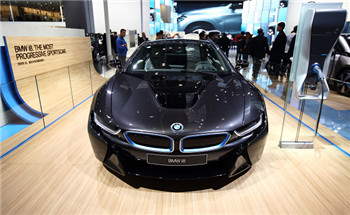
The "Made in Germany" brand is alive and well at BMW, which recorded another sales volume record in the third quarter. But concerns about China's economy dominate and the uncertainty could prompt a weakening outlook.
就宝马(BMW)的情况而言,“德国制造”这块招牌依然具有很强的号召力。今年第三季度,该公司销量再次创下纪录。但是,目前人们普遍对中国经济感到担心,这种不确定性可能会使该公司的前景受到影响。
The Munich-based premium carmaker said operating profit rose 4.3 per cent from a year ago to ㈠.35bn in the third quarter, ahead of forecasts at ㈠.16bn
这家总部位于慕尼黑的豪车制造商表示,今年第三季度的营业利润同比增长4.3%,至23.5亿欧元,高于21.6亿欧元的预测值。
Revenues accelerated 14 per cent to ㈠2.35bn, matching estimates. Profit before tax rose "significantly", up 12.8 per cent to ㈠.26bn.
营业收入增长14%,至223.5亿欧元,符合预期。税前利润“大幅”增长12.8%,至22.6亿欧元。
The company cited particular growth in the US and Europe, saying that the latter is "becoming increasingly capable of compensating for the slower growth rate in China." It forecasts the world's automobile market to grow by a total of 2.1 per cent in 2015.
宝马提到,公司在美国和欧洲的增长尤为迅猛,称欧洲市场“正变得愈发能够抵消中国增速放缓的影响。”宝马预计,2015年全球汽车市场的总体增长率将为2.1%。
BMW said "turbulence on China's stock markets was a source of much concern" as the country's stock market lost trillions of dollars worth of equity value from mid-June, giving rise to worries about growth in the world's second largest economy. "There is growing uncertainty as to how China's economy will perform in the future. If Chinese market conditions become more challenging, we cannot rule out a possible effect on our outlook," the company said.
宝马表示:“中国股市的动荡引发很大担忧。”自6月中旬以来,中国股市市值蒸发了数万亿美元,令人愈发担心世界第二大经济体的增长。“至于中国经济未来表现得怎样,这个问题的不确定性越来越大。如果中国市场环境变得更具挑战性,我们不能排除公司的前景可能会受到影响,”宝马称。
In the first nine months of the year, sales grew by 7.5 per cent, led by a double-digit gain in Europe, which accounts for 45 per cent of sales, and an 8.6 per cent rise in Asia ex-China, which takes a 13 per cent share. Sales in China, which account for more than a fifth of global sales, rose only 2 per cent (see graphic below).
今年前三个季度,宝马销量增加了7.5%,欧洲市场增幅最大,为两位数。欧洲市场占宝马总销量的45%。在除中国之外的亚洲市场,宝马销量增加了8.6%,这块市场的占比为13%。而在销量占比逾五分之一的中国市场,宝马销量增幅仅为2%(参见下图)。












